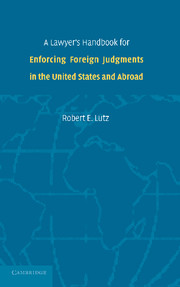Summary
As world trade steadily increases, transnational corporations proliferate and individuals transact business and personal affairs across borders with increasing frequency. Today's practitioners representing domestic civil litigants face the prospect of guarding against or satisfying judgments rendered by foreign courts. Similarly, these practitioners may seek to obtain and enforce judgments in foreign courts against their clients' foreign adversaries. Practitioners who are in specialties such as bankruptcy, family law, estate planning and probate, personal injury, products liability, intellectual property, and real estate, among others, are likely to encounter the challenge of international recognition and enforcement of judgments. As an aspect of transnational legal practice, international litigation and arbitration have become more complex since the 1960s, when the United States began to emerge from a conflicting and unpredictable common law past to embrace sophisticated uniform statutory approaches to recognition and enforcement of foreign judgments.
Despite these domestic law developments, the United States is one of the few major industrial nations that has not acceded to any international agreements for the recognition and enforcement of civil judgments. Laws of the several states govern recognition and enforcement of civil judgments rendered abroad. However, unlike sister-state judgments rendered in courts in another state jurisdiction, judgments rendered abroad do not enjoy the protection of the U.S. Constitution's Full Faith and Credit Clause. Conversely, absent federal statute, there is no federal preemption.
This text assists the practitioner seeking to enforce a foreign judgment in the United States or a U.S.-rendered judgment abroad in navigating this lack of uniformity.
- Type
- Chapter
- Information
- Publisher: Cambridge University PressPrint publication year: 2006



